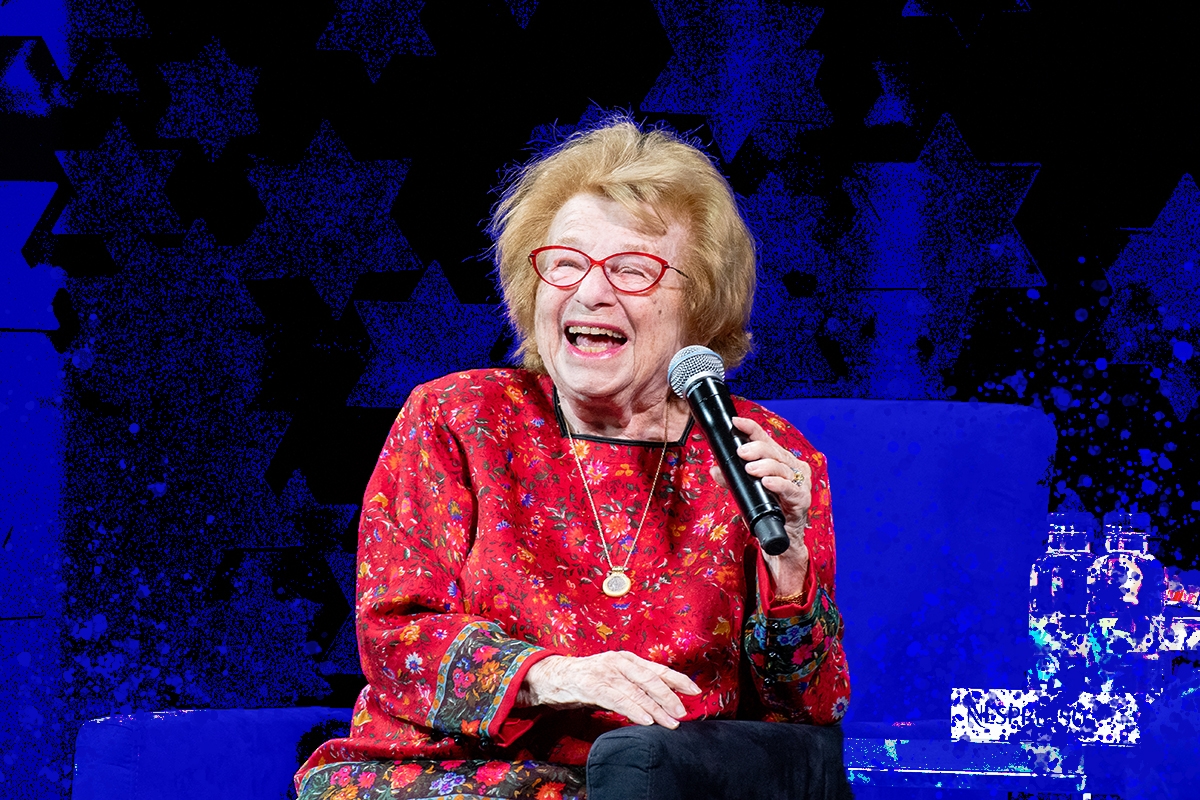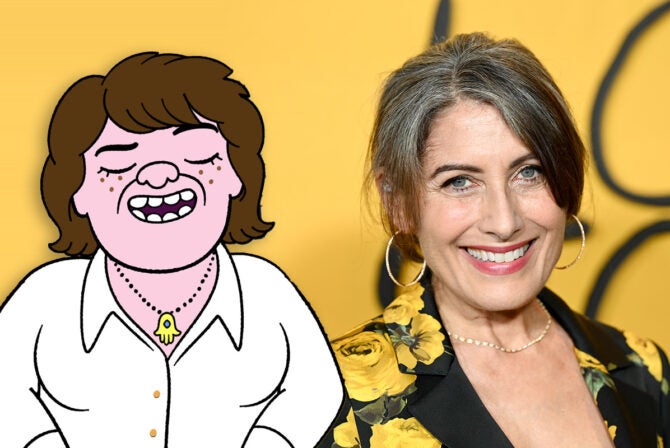“You have changed sex for Americans,” Jerry Seinfeld told Dr. Ruth in a 1986 episode of her show.
“Don’t tell me that it’s less good now,” the sex therapist chided him.
“No, it’s better now, everybody knows it!” Seinfeld rightly surmised.
It’s easy to minimize that contribution, to make it into a delightful and salacious joke (and Seinfeld, like the many comedians on her show, makes one just after that pronouncement), but the truth is that sex is a vital part of our lives, and for many, Dr. Ruth Westheimer‘s advice and candor around the topic were lifesaving — be it in helping people heal their relationships with themselves and their sexuality or feeling less ashamed and alone, especially during the AIDS crisis, when she talked about the disease in a way that advocated for patients and destigmatized the disease.
People would often stop Westheimer, who passed away this Friday at age 96, on the street to tell her she saved their lives. In the 2018 documentary “Ask Dr. Ruth,” a fan calls her as she’s live on WNYC and thanks her for just that. “You’re an angel, Dr. Ruth,” the caller tells the sex therapist, then 90.
“I’m a Jewish angel, but that’s OK,” Westheimer responds fondly.
Being Jewish shaped Westheimer’s life in many indelible ways. The renowned academic was born Karola Seigel in Frankfurt, Germany to an Orthodox Jewish family. Not a wealthy family but one full of love, her father instilled in her a passion for academics. The Hebrew words and mitzvot (Jewish commandments) of Judaism helped shape her passion for what would become her profession, from the mitzvah to have sex on Friday nights to the Hebrew word for knowing, “lada’at,” which is also the Hebrew word for having sex with someone. Early on, Ruth understood that to have a good sex life, you need to “to take the time to listen and to know each other.”
In “Ask Dr. Ruth,” she recalls that her parents gave her life twice: once when she was born, and another when they sent her away from their home in Germany to Switzerland as the Nazis rose to power. There, she lived in a Swiss orphanage where the Jewish children were treated as second-class citizens, charged with taking care of the home and the Swiss children. Westheimer never saw her parents again. Her father was killed in Auschwitz; her mother’s fate remains unknown.
It was at that orphanage that Ruth learned that a woman needs to be independent, and where, with the absence of affection from her parents, she learned about the importance of touch, intimacy and how profoundly hard loneliness can be. In her last years, Westheimer served as a “loneliness ambassador,” advocating for older adults who are suffering from an epidemic of loneliness, and she had just finished writing a book about loneliness before her passing. But her work has always been about making people feel less alone, in their relationships and their struggles.
After World War II, Ruth made her way to Mandatory Palestine. She lived on Kibbutz Ramat David, and there, on the haystacks, lost of her virginity to a soldier named Kalman. She also became a fighter for the Haganah, a Zionist paramilitary organization. “In Germany, I witnessed first hand what happened to Jews when they didn’t have their own country,” Ruth, who changed her name from Karola to her middle name after coming to the country, wrote back then as an explanation of why she trained as a sniper. While she never shot anyone, she was wounded during the Israeli War of Independence and almost lost both of her feet.
In her radio show at the now defunct WYNY, “Sexually Speaking,” and on her TV show, Westheimer would sometimes tell people to leave a relationship if it felt wrong, and that was advice that Ruth herself followed: She was married three times, once to an Israeli named David, whom she followed to France when he studied medicine. There, she signed up to study psychology at the Sorbonne, and, when David chose to go back to Israel, she decided she didn’t want to give up her education for him and they divorced. She met her second husband, the father of her daughter, Miriam, in France, and they immigrated to America together (they traveled in fourth class, and Ruth snuck up to the higher class to see the Statue of Liberty with that Emma Lazarus poem on it as they reached the shores of America, understanding instinctively that this, finally, would be her home). Ultimately Ruth left that marriage because she didn’t feel they were intellectually compatible.
Her third, and her only real marriage in her eyes, was to Manfred “Fred” Westheimer, a fellow Holocaust survivor, whom she met while skiing in the Catskills of New York. He was the head of the Jewish ski club. Two cerebral Jews of diminutive stature and with a mutual passion for the wintertime sport, they fell in love right away and remained married until Fred’s untimely death in 1997. They had a son together, Joel, and the two raised Miriam together. Whenever she was asked about their sex life, Ruth diffused the subject with a joke, saying that Fred would say about her advice, “It’s all talk.” In an interview with Diane Sawyer, he jested that “the shoemaker’s children have no shoes.”
Ruth was indefatigable. She was always studying and working, first at Planned Parenthood, then under Dr. Helen Singer Kaplan. Her radio show became a sensation, and then she got her own TV show. The opportunities kept coming, or maybe, she kept making them for herself: an acting career, a writing career (she wrote books for children and adults) and late night television appearances where she was always a riot and a delight. She was known as “Grandma Freud” (though she said she would have preferred a less aging moniker). There was just something about watching this spunky little Jewish woman saying words like “clitoris” and “premature ejaculation” that made them less scary, more natural. Ruth always saw sex as simply a part of the natural world and of natural human expression; she didn’t believe there was was only one normal way things should be.
She didn’t tout her politics or call herself a feminist, but she was a groundbreaking one nonetheless. She always fought for women to feel entitled to sexual pleasure and satisfaction; she rejected words like “frigid” and “cocktease;” hated that there was no female equivalent for “blue balls;” she believed ardently in a woman’s right to choose; promoted contraception and spoke for LGBTQ+ rights long before it was the popular thing to do. It was her experience in the Holocaust, seeing Jews treated as “sub-human,” that made her want to fight for the gay men largely impacted by AIDS.
Westheimer may have left Israel, but it remained close to her heart. Many of her books were translated to Hebrew, and she appeared on late night shows in the country, always speaking in Hebrew with her signature Yekke (German-Jewish) accent. In 1987, she was on Rivka Michaeli’s show on Friday night and reminded people that they needed to have sex (after the show’s airing, of course). In a 1989 talk show episode, she chatted about the Talmud, orgasms, cucumbers and how Israeli men should worry more about a woman’s pleasure. She even visited an art and animation festival in Israel to promote her graphic novel “Roller Coaster Grandmother.” “Becoming Dr. Ruth,” the one-woman show about Westheimer’s life, which starred Tovah Feldshuh in the U.S., was translated to Hebrew when it came to Israel, where she was played by comedian Hana Laszlo of “Shtisel” fame.
“As someone who was severely wounded in Israel’s 1948 War of Independence, of course I stand with Israel today. But those wounds also help me to identify with all the dead and wounded on both sides. This is a terrible tragedy which sadly won’t end soon,” she shared on Twitter on October 9, 2023.
Westheimer is survived by her two children and four grandchildren, but also by generations of Americans whose lives she has changed forever. May her memory be for a blessing.








